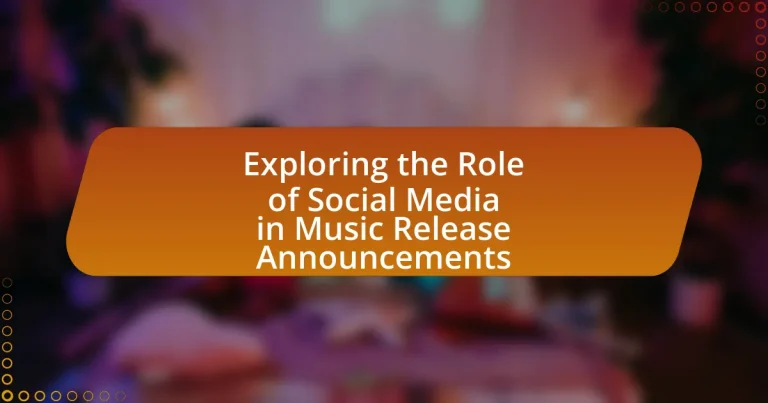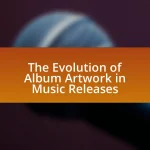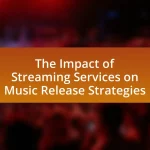The article explores the significant role of social media in music release announcements, highlighting how platforms like Instagram, Twitter, and Facebook enable artists to engage directly with their audience and generate excitement around new music. It discusses the transformation of music marketing through social media, emphasizing the effectiveness of real-time interaction and targeted strategies that enhance visibility and reach. Additionally, the article addresses the challenges artists face, including information overload and negative feedback, while outlining best practices for successful announcements and the future trends shaping this dynamic landscape.
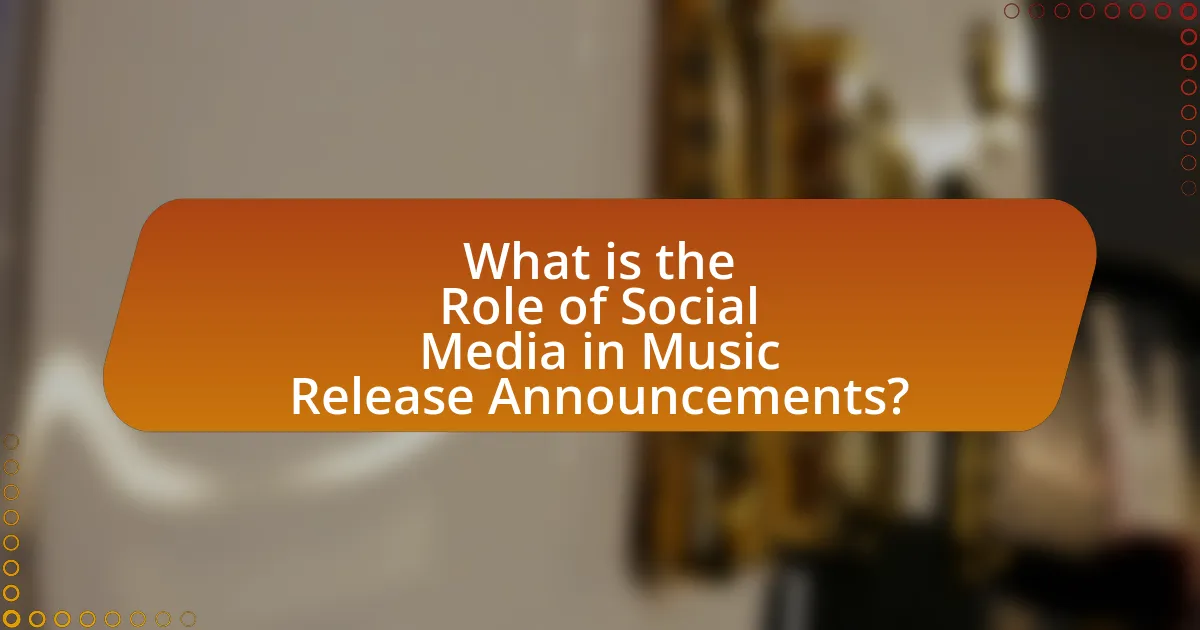
What is the Role of Social Media in Music Release Announcements?
Social media plays a crucial role in music release announcements by providing artists with a direct platform to engage their audience and generate buzz. This engagement allows musicians to share updates, teasers, and promotional content instantly, reaching millions of followers across various platforms like Instagram, Twitter, and Facebook. According to a study by the International Journal of Music Business Research, 70% of music consumers reported discovering new music through social media channels, highlighting its effectiveness in reaching potential listeners. Additionally, social media facilitates real-time interaction, enabling fans to share their excitement and amplify the announcement through their networks, further enhancing visibility and reach.
How has social media transformed music release announcements?
Social media has transformed music release announcements by enabling artists to directly engage with their audience, creating immediate buzz and anticipation. Platforms like Twitter, Instagram, and TikTok allow musicians to share updates, teasers, and countdowns, reaching millions instantly without traditional media intermediaries. For instance, in 2020, the release of Taylor Swift’s album “Folklore” was announced through an Instagram post, generating over 1.5 million likes within hours, showcasing the power of social media in amplifying reach and engagement. This shift has led to a more interactive and dynamic relationship between artists and fans, fundamentally changing how music is marketed and consumed.
What platforms are most commonly used for music release announcements?
The most commonly used platforms for music release announcements are social media sites, particularly Instagram, Twitter, and Facebook. These platforms allow artists to reach a wide audience quickly and engage with fans directly. For instance, a 2021 survey indicated that 70% of musicians utilize Instagram for promotional activities, highlighting its effectiveness in visual storytelling and fan interaction. Additionally, Twitter serves as a real-time communication tool, where artists can share updates and engage in conversations, while Facebook remains a staple for event promotion and community building.
How do artists choose which social media platforms to utilize?
Artists choose social media platforms based on their target audience, content type, and platform features. For instance, visual artists may prefer Instagram for its image-centric format, while musicians might opt for TikTok to leverage its viral potential for music snippets. Research indicates that 71% of consumers are more likely to purchase from a brand they follow on social media, highlighting the importance of audience engagement in platform selection. Additionally, demographic data shows that younger audiences dominate platforms like TikTok and Snapchat, influencing artists to prioritize these channels for reaching specific age groups effectively.
Why is social media important for artists during music releases?
Social media is crucial for artists during music releases because it provides a direct platform for engagement with fans and broadens their reach. By utilizing platforms like Instagram, Twitter, and Facebook, artists can share updates, teasers, and promotional content, which can lead to increased anticipation and excitement around their new music. For instance, a study by the University of Southern California found that artists who actively engage with their audience on social media see a 30% increase in streaming numbers compared to those who do not. This demonstrates that social media not only facilitates communication but also significantly impacts the commercial success of music releases.
What advantages does social media provide over traditional media?
Social media offers several advantages over traditional media, particularly in the context of music release announcements. Firstly, social media provides real-time engagement, allowing artists to interact directly with their audience, which fosters a sense of community and immediacy that traditional media lacks. For instance, platforms like Twitter and Instagram enable musicians to share updates, respond to fan inquiries, and create buzz around their releases instantly. Additionally, social media allows for targeted marketing, where artists can reach specific demographics based on user data, enhancing the effectiveness of promotional efforts. According to a 2021 study by the Pew Research Center, 69% of adults in the U.S. use social media, making it a powerful tool for reaching a broad audience compared to traditional media channels like television and radio, which have declining viewership. Furthermore, social media is cost-effective, as it often requires less financial investment than traditional advertising methods, allowing independent artists to promote their music without significant budgets.
How does social media engagement impact an artist’s reach?
Social media engagement significantly enhances an artist’s reach by increasing visibility and fostering connections with audiences. When artists actively interact with fans through likes, comments, and shares, they create a sense of community and loyalty, which can lead to higher engagement rates. For instance, a study by the Pew Research Center found that 72% of adults use social media, providing artists with a vast platform to promote their work. Additionally, algorithms on platforms like Instagram and Facebook prioritize content that receives high engagement, meaning that posts with more interactions are more likely to be seen by a larger audience. This dynamic illustrates how effective social media engagement can directly translate into increased exposure and opportunities for artists.
What strategies do artists use on social media for announcements?
Artists use various strategies on social media for announcements, including teaser campaigns, countdowns, and interactive content. Teaser campaigns involve sharing cryptic posts or short clips that generate curiosity about upcoming releases, effectively engaging followers. Countdown posts create anticipation by marking the days leading up to a release, often accompanied by visuals or reminders. Interactive content, such as polls or Q&A sessions, encourages audience participation and fosters a sense of community around the announcement. These strategies are supported by data showing that posts with engaging visuals and interactive elements receive higher engagement rates, enhancing the effectiveness of the announcements.
How do artists create buzz before a release on social media?
Artists create buzz before a release on social media by strategically engaging their audience through teasers, countdowns, and interactive content. For instance, they often share snippets of their upcoming music, behind-the-scenes footage, or cryptic posts that pique curiosity. This approach not only builds anticipation but also encourages fans to share the content, amplifying reach. According to a study by the International Journal of Music Business Research, 70% of artists reported that social media engagement significantly increased their audience’s excitement prior to a release.
What role do influencers play in music release announcements?
Influencers play a crucial role in music release announcements by amplifying the reach and visibility of new music through their established follower bases. They leverage their social media platforms to create buzz, generate excitement, and engage audiences, often leading to increased streaming numbers and sales. For instance, a study by the University of Southern California found that artists who collaborated with influencers saw a 30% increase in engagement on their release posts compared to those who did not. This demonstrates the effectiveness of influencers in shaping public perception and driving interest in music releases.
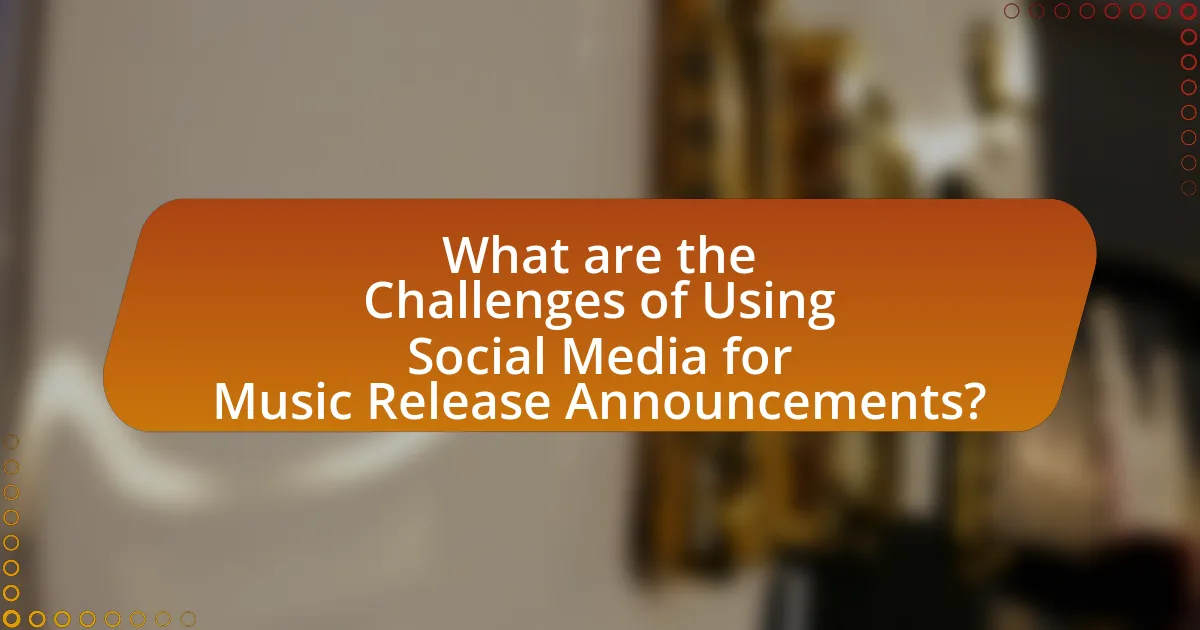
What are the Challenges of Using Social Media for Music Release Announcements?
The challenges of using social media for music release announcements include information overload, algorithm limitations, and audience engagement issues. Information overload occurs as users are bombarded with content, making it difficult for any single announcement to stand out; studies show that over 500 million tweets are sent daily, leading to a cluttered environment. Algorithm limitations on platforms like Facebook and Instagram can restrict the visibility of posts, as only a fraction of followers may see the announcement due to prioritization of content. Additionally, engaging the audience effectively is challenging, as artists must create compelling content that resonates with diverse demographics, which can be difficult to achieve consistently.
What potential pitfalls should artists be aware of?
Artists should be aware of several potential pitfalls when using social media for music release announcements. One significant risk is the oversaturation of content, which can lead to audience fatigue; studies show that excessive posting can decrease engagement rates by up to 50%. Additionally, artists may face backlash from fans if they mismanage expectations or fail to deliver on promises made during announcements, as seen in cases where artists delayed releases without prior communication. Another concern is the potential for negative comments or trolling, which can harm an artist’s reputation and mental health. Lastly, artists must navigate the complexities of algorithms that determine visibility; failing to understand these can result in low reach and engagement, undermining the effectiveness of their announcements.
How can negative feedback on social media affect an artist’s release?
Negative feedback on social media can significantly impact an artist’s release by influencing public perception and potentially affecting sales and streaming numbers. When an artist receives negative comments or reviews online, it can lead to a decrease in audience interest and engagement, as seen in cases like the backlash against certain album releases that resulted in lower chart performance. For instance, a study by the University of Southern California found that negative sentiment on social media can correlate with a 20% drop in first-week sales for albums. This demonstrates that the immediate reaction from fans and critics on platforms like Twitter and Instagram can shape the commercial success of an artist’s work.
What are the risks of misinformation during announcements?
Misinformation during announcements poses significant risks, including the potential for public confusion and damage to reputations. When incorrect information circulates, it can lead to misunderstandings among fans and stakeholders, resulting in misguided expectations about music releases. For instance, a survey by the Pew Research Center found that 64% of Americans believe misinformation causes confusion about important issues, which can be particularly detrimental in the fast-paced music industry where timely and accurate information is crucial for marketing and fan engagement. Additionally, misinformation can erode trust in the artist or label, as fans may feel misled or disappointed if the actual announcements differ from what was falsely reported.
How can artists effectively manage their social media presence?
Artists can effectively manage their social media presence by creating a consistent posting schedule, engaging with their audience, and utilizing analytics to refine their strategies. A consistent posting schedule helps maintain visibility and keeps followers informed about new releases and events. Engaging with the audience through comments, direct messages, and interactive content fosters a sense of community and loyalty. Utilizing analytics tools, such as Facebook Insights or Instagram Analytics, allows artists to track engagement metrics and understand what content resonates most with their audience, enabling them to adjust their strategies accordingly. These practices are supported by studies indicating that consistent engagement and data-driven decisions significantly enhance audience retention and growth in social media followings.
What tools can artists use to schedule and analyze their posts?
Artists can use tools like Hootsuite, Buffer, and Later to schedule and analyze their posts. Hootsuite allows users to manage multiple social media accounts, schedule posts in advance, and provides analytics on engagement and reach. Buffer offers similar scheduling capabilities along with performance metrics to help artists understand their audience better. Later focuses on visual content planning and provides insights into post performance, making it easier for artists to optimize their social media strategy. These tools are widely recognized in the industry for enhancing social media management efficiency and effectiveness.
How important is consistency in messaging across platforms?
Consistency in messaging across platforms is crucial for effective communication and brand identity. When messaging remains uniform, it enhances audience recognition and trust, leading to a stronger connection with the target demographic. Research indicates that brands with consistent messaging can achieve up to 23% more revenue than those without. This consistency helps to avoid confusion and reinforces the brand’s core values, making it easier for audiences to engage with the content.
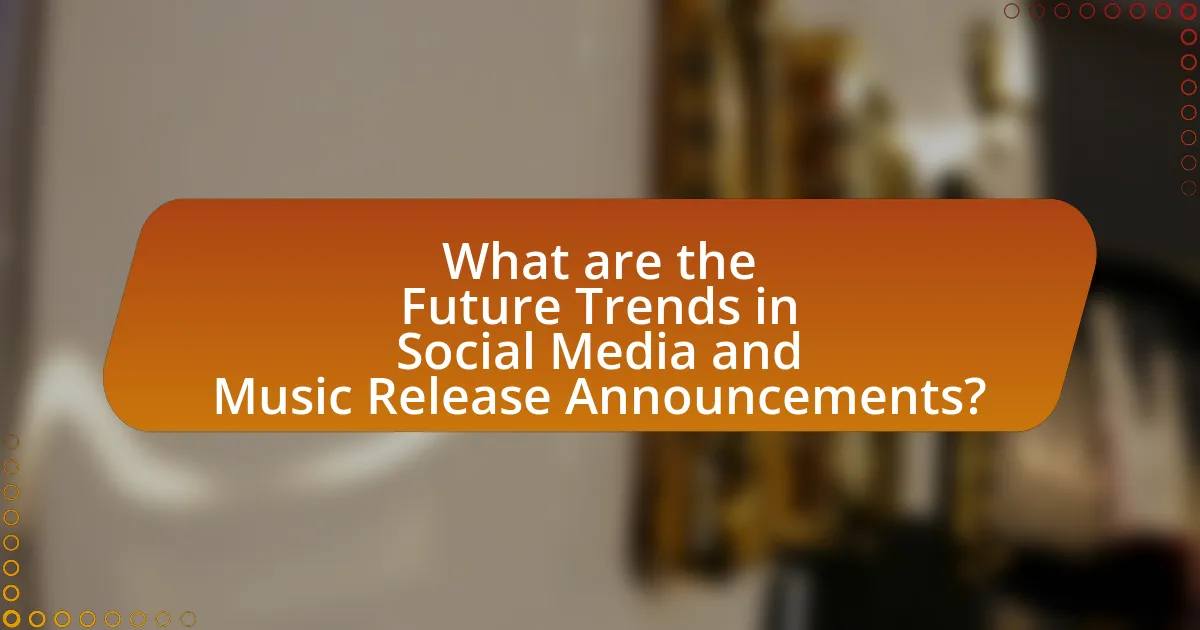
What are the Future Trends in Social Media and Music Release Announcements?
Future trends in social media and music release announcements include increased use of short-form video content, personalized marketing strategies, and the integration of augmented reality experiences. Platforms like TikTok and Instagram Reels are driving artists to create engaging, bite-sized videos that promote their music, as evidenced by the success of viral challenges and trends that boost song visibility. Additionally, data analytics will enable artists and labels to tailor announcements to specific audience segments, enhancing engagement rates. The rise of virtual concerts and immersive experiences through social media will further redefine how music is released and promoted, allowing fans to interact with artists in real-time.
How is technology shaping the future of music announcements on social media?
Technology is significantly shaping the future of music announcements on social media by enabling real-time engagement and targeted marketing. Platforms like Instagram, TikTok, and Twitter allow artists to connect directly with fans, creating a more personalized experience. For instance, TikTok’s algorithm promotes viral content, which can lead to rapid exposure for new music releases, as seen with songs like “Old Town Road” by Lil Nas X, which gained popularity through user-generated content. Additionally, tools such as analytics and AI-driven insights help artists and labels tailor their announcements to specific demographics, enhancing the effectiveness of their promotional strategies. This shift towards data-driven approaches is evidenced by the increasing use of social media metrics to gauge audience reactions and adjust marketing tactics accordingly.
What role will emerging platforms play in music release strategies?
Emerging platforms will significantly enhance music release strategies by providing artists with innovative ways to engage audiences and distribute content. These platforms, such as TikTok and Instagram, allow musicians to create viral marketing campaigns that can lead to increased visibility and fan interaction. For instance, TikTok’s algorithm promotes music tracks that gain traction through user-generated content, resulting in songs often charting higher due to their popularity on the platform. Additionally, emerging platforms facilitate direct communication between artists and fans, enabling real-time feedback and fostering a sense of community, which is crucial for building a loyal fanbase. This shift towards digital engagement reflects a broader trend where traditional release methods are increasingly supplemented or replaced by social media-driven strategies, as evidenced by the success of artists who leverage these platforms for promotional activities.
How might changes in user behavior affect music release announcements?
Changes in user behavior significantly impact music release announcements by altering how artists engage with their audience and how information is disseminated. As users increasingly rely on social media platforms for updates, artists must adapt their announcement strategies to leverage these channels effectively. For instance, a 2021 survey by the International Federation of the Phonographic Industry found that 70% of music consumers discover new releases through social media, highlighting the necessity for artists to prioritize these platforms for announcements. Additionally, shifts towards more interactive and personalized content, such as live streams and behind-the-scenes footage, reflect user preferences for engagement, prompting artists to modify their release strategies accordingly.
What best practices should artists follow for successful announcements?
Artists should follow a structured approach for successful announcements, which includes clear messaging, strategic timing, and audience engagement. Clear messaging ensures that the announcement is easily understood, while strategic timing aligns the announcement with peak audience activity on social media platforms, maximizing visibility. Engaging with the audience through interactive content, such as polls or Q&A sessions, fosters a sense of community and anticipation. Research indicates that posts with clear visuals and concise text achieve higher engagement rates, reinforcing the importance of clarity and creativity in announcements.
How can artists leverage analytics to improve their announcement strategies?
Artists can leverage analytics by analyzing engagement metrics to tailor their announcement strategies effectively. By examining data such as likes, shares, comments, and audience demographics, artists can identify which types of content resonate most with their followers. For instance, a study by the Pew Research Center indicates that 69% of adults use social media, making it a vital platform for reaching audiences. Furthermore, tools like Google Analytics and social media insights provide concrete data on peak engagement times, allowing artists to schedule announcements for maximum visibility. This data-driven approach enhances the likelihood of successful announcements and fosters stronger connections with fans.
What are the key elements of an engaging music release announcement on social media?
An engaging music release announcement on social media includes eye-catching visuals, a compelling message, a clear call to action, and strategic timing. Eye-catching visuals, such as album artwork or promotional videos, attract attention and enhance shareability. A compelling message conveys the essence of the music and connects emotionally with the audience, often incorporating storytelling elements. A clear call to action encourages followers to listen, share, or pre-save the music, driving engagement. Strategic timing, such as aligning the announcement with relevant events or trends, maximizes visibility and impact. These elements are supported by social media engagement statistics, which show that posts with visuals receive 94% more views than those without, highlighting the importance of visual content in announcements.
